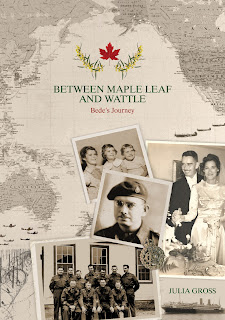 |
| Capt Bede Smith, middle row seated on the left. Photo probably taken in the UK in 1943 or 1944 |
|
|
|
The piece below is a first draft of a scene from my book about the life of Bede Smith
*********************************
Bound for Europe, 1943
On 5 September 1943, Bede left the army transit camp in Windsor, Ontario and travelled by train to Halifax, where a carrier waited to transport the Canadian Fourth Armoured Division across the Atlantic. The SS Queen Elizabeth, had been stripped of its luxury fittings and converted into a troop ship. Repainted battleship grey, the modern ocean liner ran the Atlantic at high speed, zig-zagging to avoid encounters with enemy warships and U-boats. There were 13,000 personnel on board for the crossing. With so many troops, all needing to be berthed and fed, the operation was handled with military precision. Bede, like all the others, wore a coloured label indicating in which zone he was berthed. The ship's dining room held 2,000 and meals were served around the clock. No sooner had the last breakfast been served, than lunch began. After lunch the queues formed again for the first evening meal.
Six days after leaving Halifax, the ship landed safely in the United Kingdom. The invasion of Europe was imminent, but no one knew exactly when or where it would occur. All military intelligence was shrouded in secrecy. As it turned out, the Fourth Division would remain in the UK for another 10 months, undergoing rigorous training in an atmosphere of mounting tension.
Upon their arrival in Southampton, the Canadians were transported to a busy military camp in the town of Bordon, East Hampshire in the south of England. The once quiet country roads around Bordon growled with the flow of military vehicles coming and going. Situated in a picturesque landscape of rolling hills and lush green pastures, Bordon offered the troops some recreational opportunities off-base. Whenever he had the chance, Bede took a pass which allowed him to walk into the local town.
More than a month after arriving in Bordon, Bede was returning to barracks by foot along a winding country road. It was harvest time and the haystacks, piled high in the stubbled fields, were touched bronze by the setting sun. In the calm of the late afternoon, the only sound was his own footfall and the plaintive bleating of a lamb. Bede stopped along the road to inspect a flock of black-faced sheep curiously eyeing him from behind the hedgerow. Just then, true to form, a soft drizzle began to fall. The road became shiny and slick with oil residue – time to hurry back to barracks. He quickened his pace.
All of a sudden, came a loud rumble from behind. A vehicle bore down on him. There was a screech of brakes. Bede had no time to react before a truck loomed up and flung him side-ways into the ditch. He hit the ground with a thud, doubling over in pain.
A few yards up ahead the Bedford truck pulled over, its engine still running. A cloud of acrid smoke wafted back and Bede felt himself starting to retch. The driver leapt down from the truck cabin and ran back to where Bede sat dazed on the ground.
'Bloody hell. Sorry, mate. I didn't see you. That bend in the road. Are you OK?'
Bede looked down. The wool of his khaki army jacket was torn at the elbow. He tried to move and sit up, but winced in pain.
'Damn. It's my arm,' Bede said, a sharp tone to his voice.
His hand and arm had taken the full brunt of the fall. Blood congealed around a wound on his hand which was dirty with grit and gravel.
Bede tried to flex his hand.
'Ouch! Christ!'
The truck driver moved in closer. He was a pale, freckled young lad, with a cigarette hanging from his lower lip. He stared down at Bede and flicked his cigarette on the ground.
'Blimey. You're as white as a sheet.'
Bede sat up and moved his arm and shoulder again.
'I hope it's not broken,' he said, trying to remain civil.
Bede felt like he'd done ten rounds in the boxing ring and was down for the count. Finally he pulled himself up to his full height, shook himself off and straightened his uniform. The pants were soaked through from the muddy ditch.
At this point the driver, observing his rank, started up again.
'I'm dreadfully sorry, Captain.'
'Look. I'm OK.' This lad was starting to annoy him now.
'I'll take you to Bordon Camp.'
'That would make sense,' Bede said, a slight tone of sarcasm in his voice.
In the dwindling light they drove back to the army base. The driver attempted to make conversation, but Bede was occupied with his own thoughts. The injury weighed heavily on him. Some years previously, he had hurt himself playing cricket. Since then, he'd been plainly aware that his hands were his lifeline. Any accident could derail his future career in dentistry. And he hadn't even seen action in this war. He tried to put such bleak thoughts aside and remain calm.
It was dark by the time they saw the lights of Bordon Camp and drove through the security gates. Bede directed the driver to the front door of the hospital, where he hauled himself down from the truck and went indoors to find the duty doctor.








